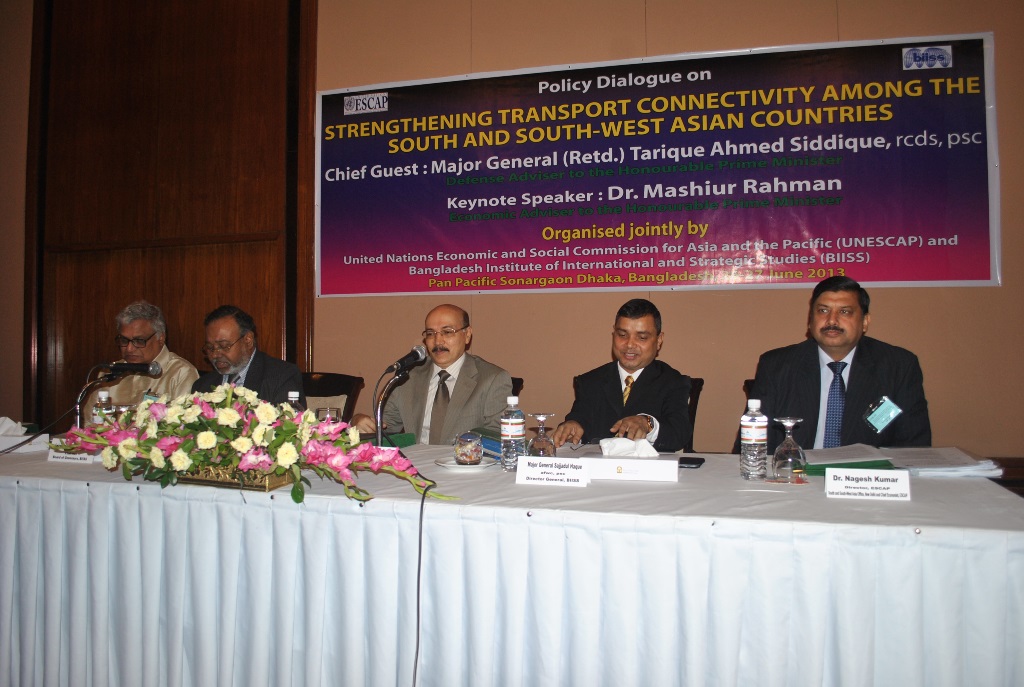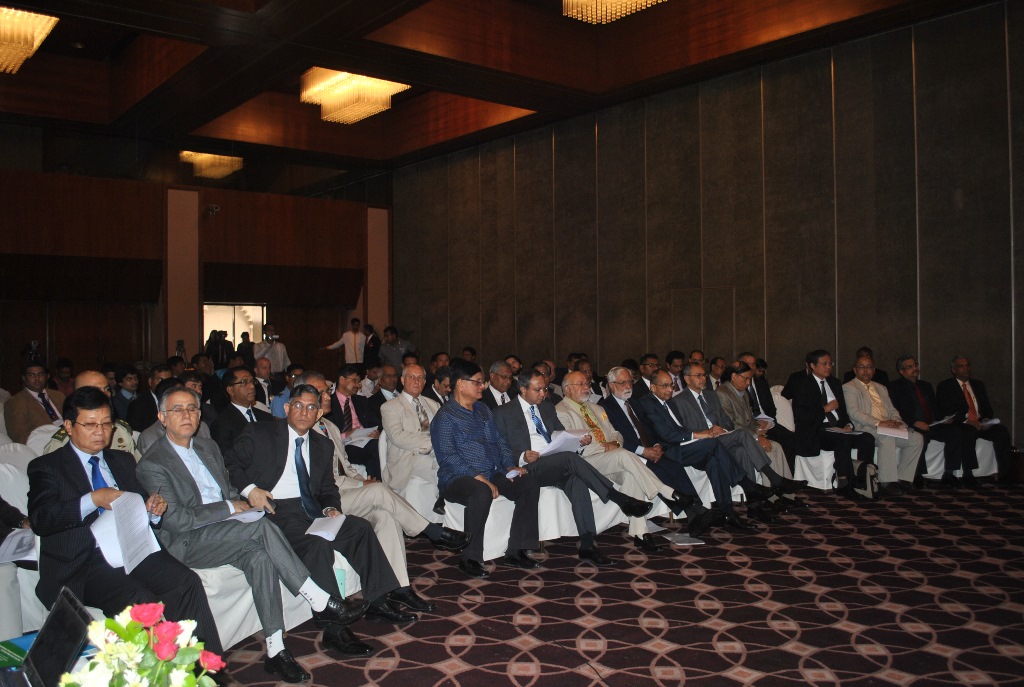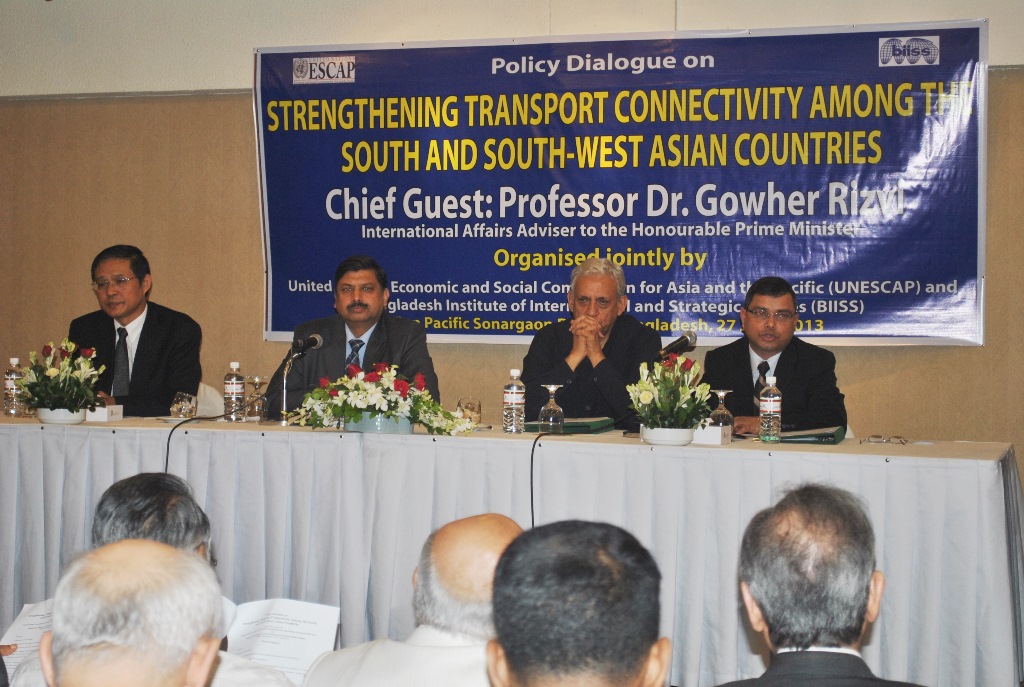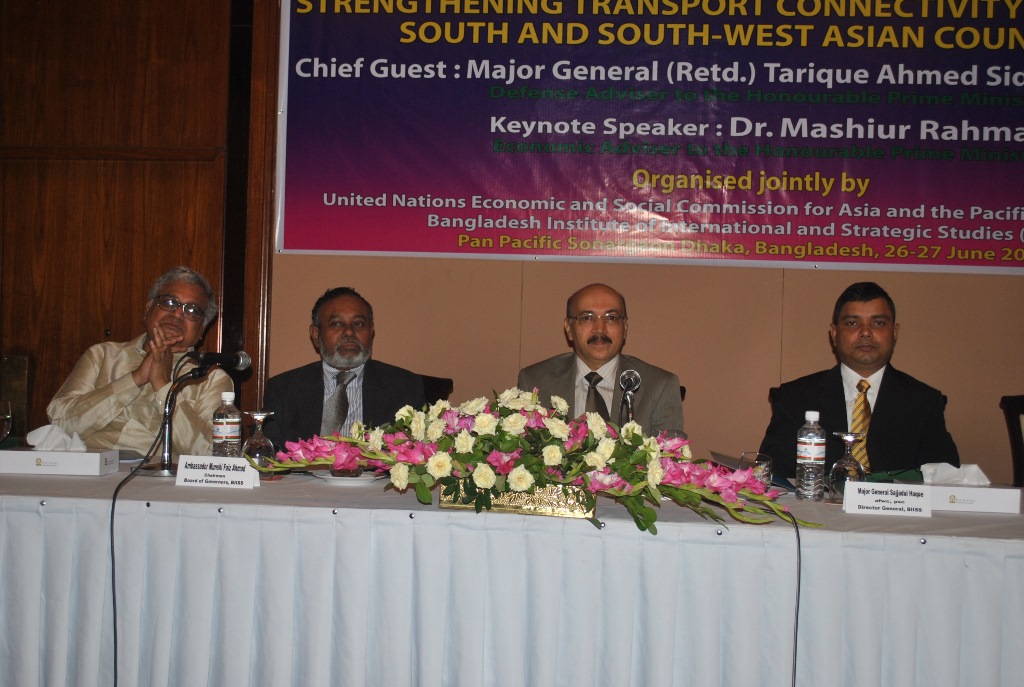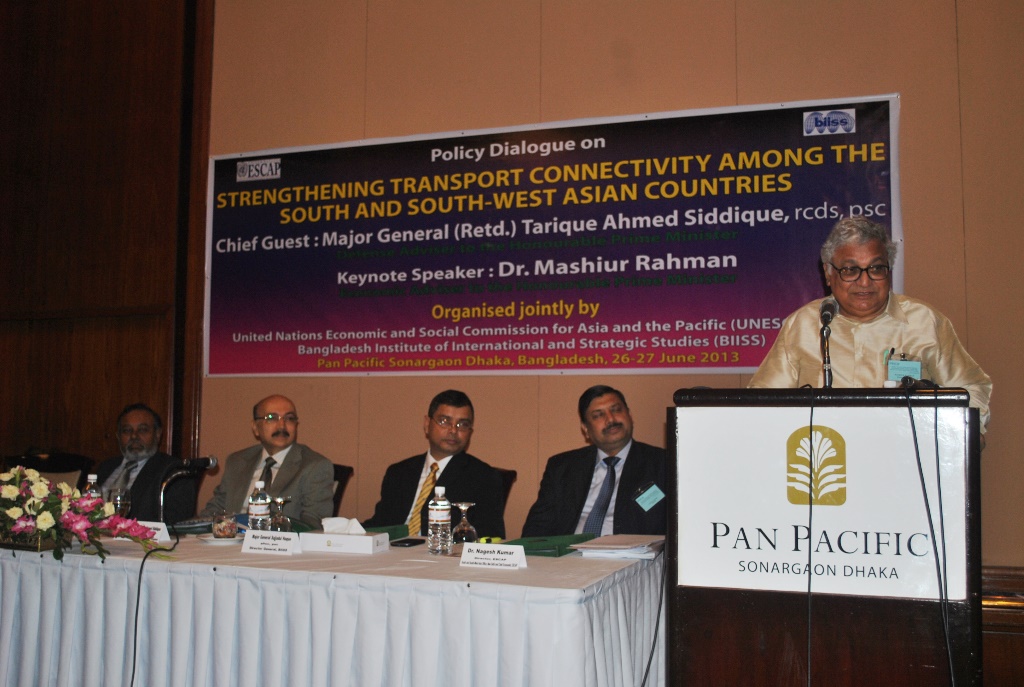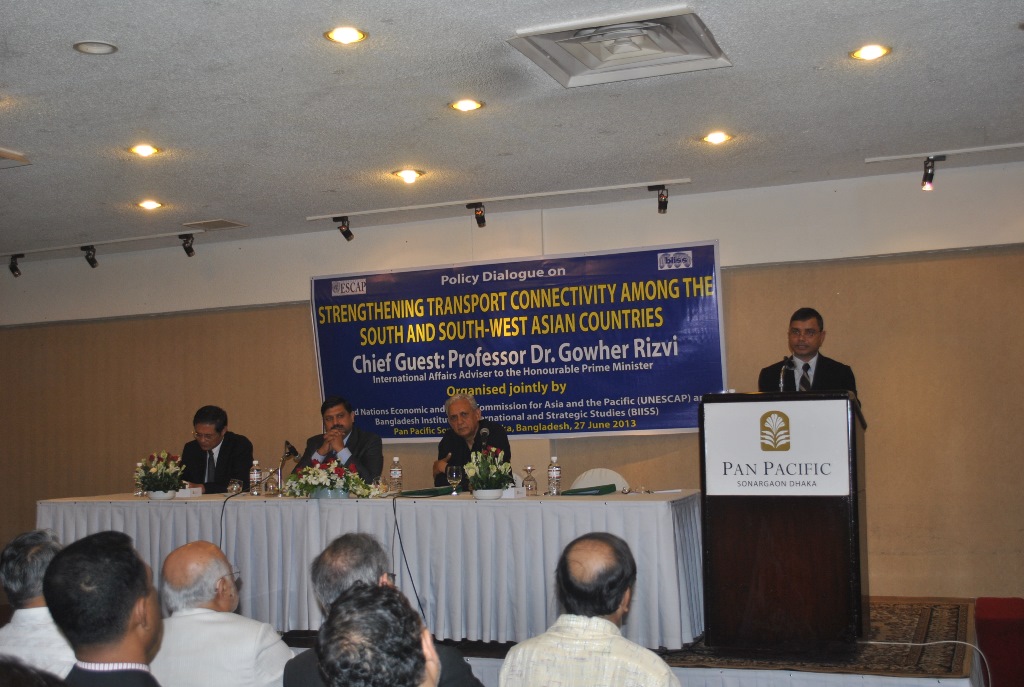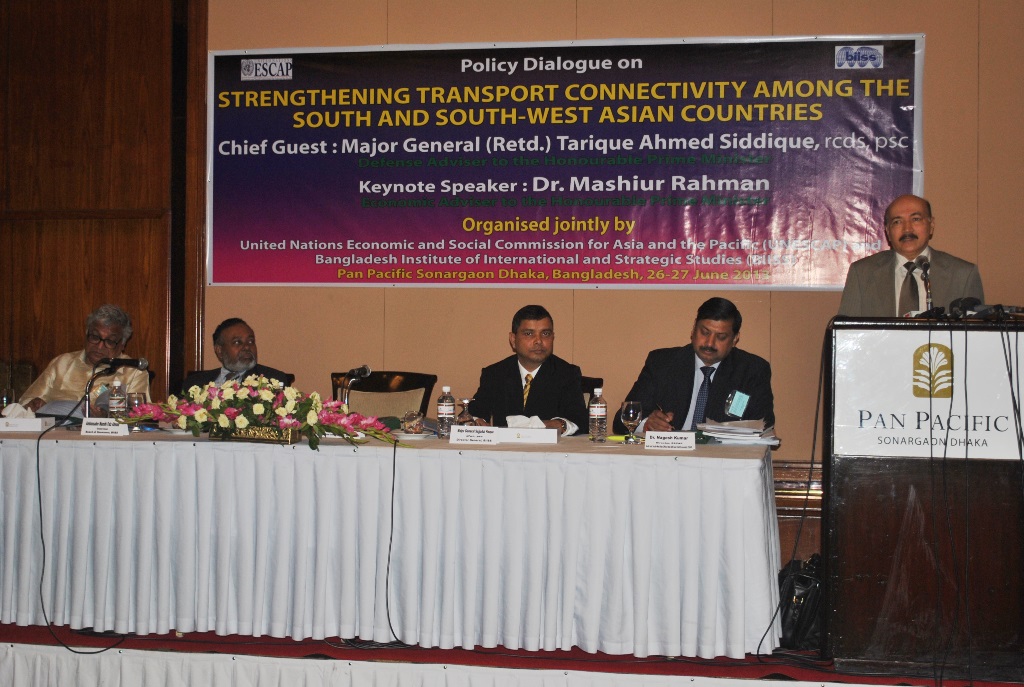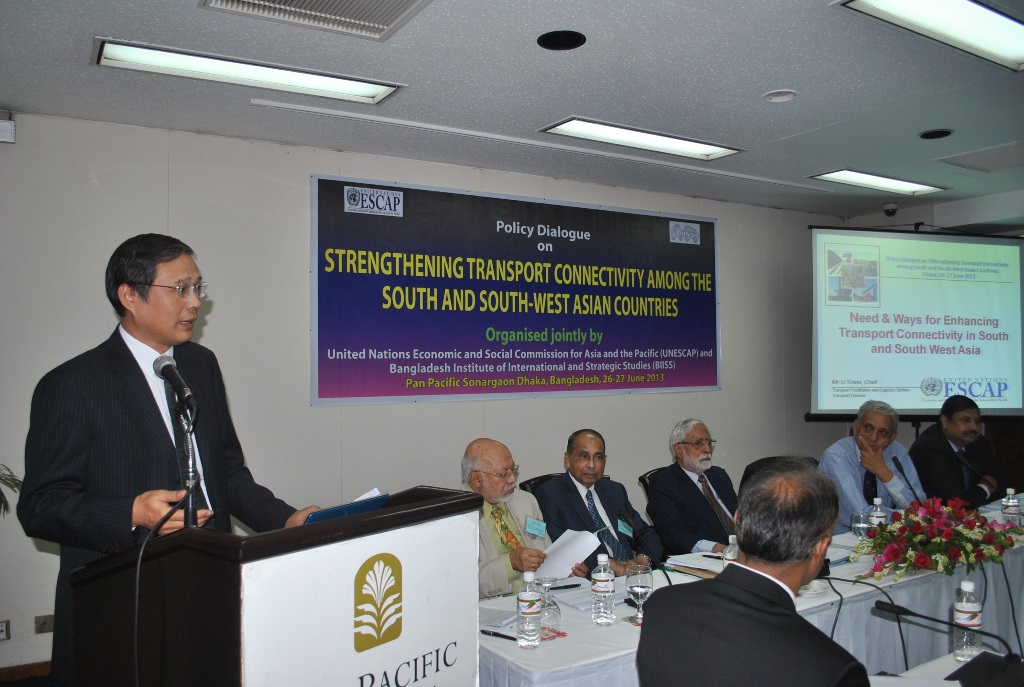Policy Dialogue on Strengthening Transport Connectivity among the South and South- West Asian Countries on 26-27 June 2013
DATE: 2013-06-27
United Nations Economic and Social Commission for Asia and the Pacific (UNESCAP) and Bangladesh Institute of International and Strategic Studies (BIISS) jointly organised a Policy Dialogue on Strengthening Transport Connectivity among the South and South-West Asian Countries on Wednesday and Thursday, 26th and 27th June 2013, at Hotel Pan Pacific Sonargaon, Dhaka. Major General (Retd.) Tarique Ahmed Siddique, rcds, psc, Honourable Defence Adviser to the Prime Minister, Government of the People's Republic of Bangladesh, was present as the Chief Guest in the inaugural session. Dr. Mashiur Rahman, Economic Adviser to the Prime Minister, Government of the People's Republic of Bangladesh, presented the keynote paper in the session. Ambassador Munshi Faiz Ahmad, Chairman, Board of Governors of BIISS, chaired the inaugural session. Major General Sajjadul Haque, afwc, psc, Director General of BIISS, delivered the Address of Welcome. In the closing session of the two-day long policy dialogue H.E. Gowher Rizvi, International Affairs Adviser to the Prime Minister, Government of the People's Republic of Bangladesh, was present as the Chief Guest.
Scholars, members of academia and policy makers from Afghanistan, Bhutan, India, Iran, Nepal, Pakistan and Turkey are to participate in the Dialogue and would share their expertise on the topic of the Policy Dialogue. Representatives from UNESCAP, SAARC, ECO, BIMSTEC, ADB, ISDB, JICA, AUSAID, World Bank, UNCTAD and local participants from various government ministries, organisations and academic institutes also participated in the policy dialogue. The joint policy dialogue has been divided into six working sessions beside the opening and concluding sessions.
In his Welcome Address the Director General of BIISS told that an efficient transport system is the key to initiate and sustain development process through market integration, expansion and induce growth. Specially, development of cross border transport and communication has become a prerequisite for regional and sub-regional cooperation. Against this sub-regional dimension, it is necessary to study systematically the existing transport network. He also added that intra-regional and intra-sub regional trade would play a critical role in strengthening economic integration in South and South-West Asia. To maximize the economic gain General Sajjad emphasized on efficient operational transport connectivity, easy and border clearance procedure and efficient arrangements for cross border and transit transport.
The presenter in the key note paper focused on challenges and opportunities of regional connectivity. He identified Bangladesh's state of nervous isolation in the early 1990's as the reason not to join UNESCAP developed Asian Highway Network (AHN) and the Trans-Asian Railway Network (TRAN). However that missed opportunity was rectified when the instrument of accession to AHN was signed in July 2009; and that for TARN, signed in November 2007, deposited in August 2011 thereby Bangladesh came out of the nervous insularity or isolation of the past. Connectivity, including transit, should be seen in the context of long term cooperation on a broad front which includes several sectors of the economy, he opined. Transit is welfare enhancing for all cooperating countries, and augments public revenues and, the transit-user state should pays the transit-provider state for right of access, he stated.
Dr. Rahman suggested Bangladesh and India may initiate consultations with Bhutan and Nepal for replacing the current bilateral agreements by trilateral agreements, having India as a common contracting party, which would accelerate the removal of the trade-obstructive rules and procedures. To negate the sensitive political dimension of cooperation the UN and the multilateral financial institutions may assist the sub-regional countries in cooperating with resource mobilization and professional / technical support since they have the a-political nature of the international organizations, he opined.
Major General (Retd.)Tarique Ahmed Siddique, rcds, psc, Honourable Defence Adviser to the Prime Minister, said that UNESCAP South and South West Asia office is playing a pioneering role in exploring untapped potentials for strengthening connectivity in the region. It is estimated that South and South West Asia have grown at 7.5 percent in 2010 as compared to 3.9 percent in 2009. Revival in investment and private consumption, growth in exports, rise in industrial production and improved performance by agricultural sector helped to achieve such strong growth. However, the region has been facing vulnerabilities to financial volatility, natural disasters, epidemics, food and energy insecurity, adverse impacts of climate change and so on. However, it is agreed by almost all economists and politicians that facilitation of connectivity would help all the countries of the region to continue economic development and face emerging development challenges of the region.
In his Chairman's remarks Ambassador Munshi Faiz Ahmad stressed on the importance of connectivity on global and regional agenda as a tool for promoting trade and commerce, and enhancing interaction, cooperation and understanding among peoples in different countries and regions. He mentioned that regional countries of South and South West Asia have recognised the importance of connectivity and are undertaking policies to improve connectivity in and beyond their neighbourhood. In his speech he flagged three points. First, he considered transport connectivity as a tool for enhancing contacts and cooperation across borders, emphasising on the necessity of user friendly connectivity infrastructure. Then, he called for a big picture, a universal and global connectivity by ensuring unending linkages across countries and regions in all directions. And finally, he asked the regional countries to agree on universally acceptable, user-friendly and easy regimes for visa and transit of goods, services and people across borders and to harmonise standards, customs, immigration, banking and other involved procedures.
Participants in the policy dialogue have emphasized the importance of proper transport connectivity and efficient linkages among the South and South-Western countries. The participants also opined that a multilayered regional connectivity will foster stable and optimum economic growth for the countries of this region by enhancing aggregate regional trade. Bangladesh as well as other countries of the region will be benefitted by the inter-connected transport system which is conducive to socio-economic development. An effective transport network is also directly contributes to the key development and poverty reduction strategies. Different scholars in the seminar also think that transport networks help to deliver economic and social benefits to their destinations and enables individuals to meet their necessary requirements, which in this age of globalization carries enormous importance. Almost every participants in the policy dialogue recognized UNESCAP's role in the transport connectivity among the South and South-Western countries.

